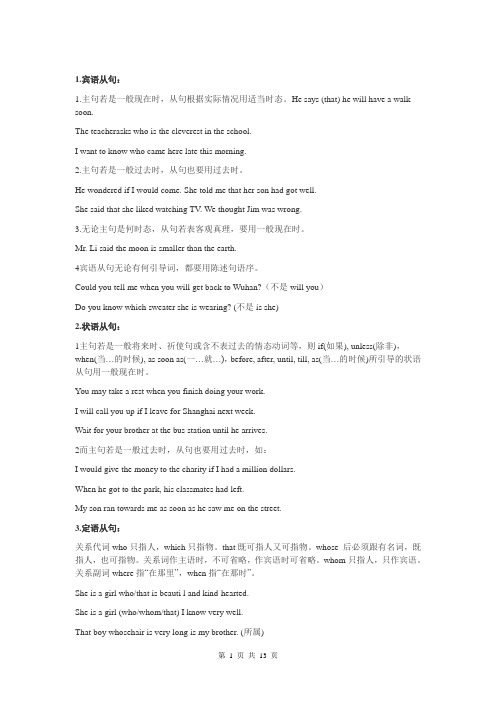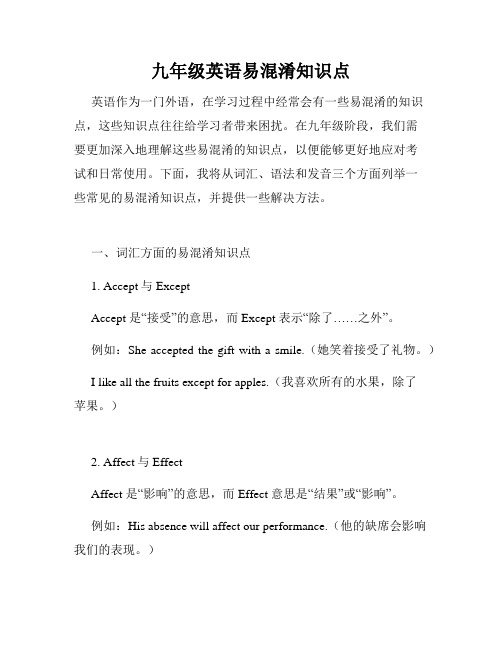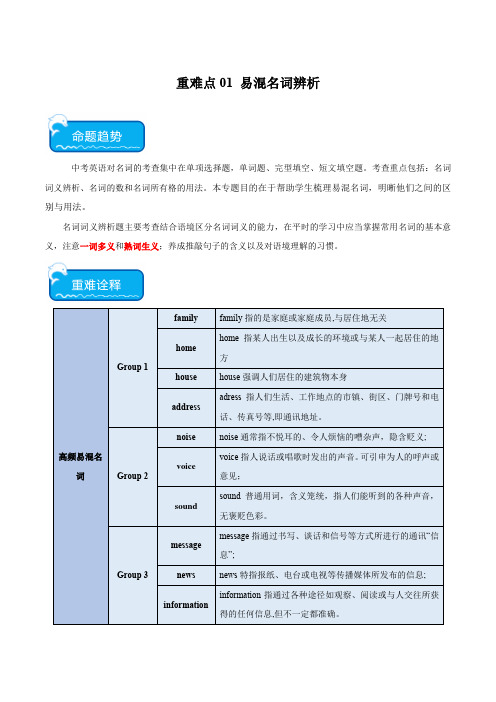(精品)初中英语-中考英语必备-易混淆知识点总结202
初中英语-中考英语必备-易混淆知识点总结

1.宾语从句:1.主句若是一般现在时,从句根据实际情况用适当时态。
He says (that) he will have a walk soon.The teacherasks who is the cleverest in the school.I want to know who came here late this morning.2.主句若是一般过去时,从句也要用过去时。
He wondered if I would come. She told me that her son had got well.She said that she liked watching TV. We thought Jim was wrong.3.无论主句是何时态,从句若表客观真理,要用一般现在时。
Mr. Li said the moon is smaller than the earth.4宾语从句无论有何引导词,都要用陈述句语序。
Could you tell me when you will get back to Wuhan?(不是will you)Do you know which sweater she is wearing? (不是is she)2.状语从句:1主句若是一般将来时、祈使句或含不表过去的情态动词等,则if(如果), unless(除非),when(当…的时候), as soon as(一…就…),before, after, until, till, as(当…的时候)所引导的状语从句用一般现在时。
You may take a rest when you finish doing your work.I will call you up if I leave for Shanghai next week.Wait for your brother at the bus station until he arrives.2而主句若是一般过去时,从句也要用过去时,如:I would give the money to the charity if I had a million dollars.When he got to the park, his classmates had left.My son ran towards me as soon as he saw me on the street.3.定语从句:关系代词who只指人,which只指物。
九年级英语易错知识点汇总

九年级英语易错知识点汇总一、动词时态和语态动词时态和语态是九年级英语中的一个易错知识点。
学生常常会在使用时态和语态时出现错误。
下面是一些常见的易错点:1. 一般现在时和现在进行时的区别:一般现在时用于表示客观事实、普遍真理或经常性的动作;而现在进行时则表示目前正在进行的动作。
2. 一般过去时和过去进行时的区别:一般过去时用于表示过去某个时间发生的动作或状态,而过去进行时则表示过去某个时间段内正在进行的动作。
3. 一般将来时和将来进行时的区别:一般将来时用于表示将来的动作或事件,而将来进行时则表示将来某个时间段内会正在进行的动作。
4. 主动语态和被动语态的转换:主动语态强调动作的执行者,而被动语态则强调动作的承受者。
在转换时要注意时态和语态的变化。
二、形容词和副词的比较级和最高级形容词和副词的比较级和最高级也是九年级英语中常出现的易错知识点。
以下是一些容易出错的地方:1. 单音节形容词和副词的比较级和最高级的变化规则:一般在形容词和副词后面加-er 和 -est 来表示比较级和最高级。
2. 双音节或多音节形容词和副词的比较级和最高级的变化规则:在形容词和副词前面加more 和 most 来表示比较级和最高级。
3. 不规则变化的形容词和副词:有一些形容词和副词的比较级和最高级变化是不规则的,需要记忆。
三、介词的使用介词是英语中的一项重要语法知识,也是一个容易出错的地方。
以下是一些常见的介词使用错误:1. at, in, on 的使用:at 用于表示时间的具体点,in 用于表示时间的段或季节,on 用于表示特定日期或星期几。
2. in, on 的使用:in 用于表示在一个地点或范围内,on 用于表示在一个平面上或接触到的表面上。
3. with, by 的使用:with 表示伴随的状态或工具,by 表示通过某种方式或方法。
四、动词不定式和动名词的用法动词不定式和动名词经常会被学生搞混,容易出现错误。
以下是一些常见的误用情况:1. 动名词作主语:动名词作主语时,谓语动词要用单数形式。
九年级英语易混淆知识点

九年级英语易混淆知识点英语作为一门外语,在学习过程中经常会有一些易混淆的知识点,这些知识点往往给学习者带来困扰。
在九年级阶段,我们需要更加深入地理解这些易混淆的知识点,以便能够更好地应对考试和日常使用。
下面,我将从词汇、语法和发音三个方面列举一些常见的易混淆知识点,并提供一些解决方法。
一、词汇方面的易混淆知识点1. Accept与ExceptAccept 是“接受”的意思,而Except 表示“除了……之外”。
例如:She accepted the gift with a smile.(她笑着接受了礼物。
)I like all the fruits except for apples.(我喜欢所有的水果,除了苹果。
)2. Affect与EffectAffect 是“影响”的意思,而Effect 意思是“结果”或“影响”。
例如:His absence will affect our performance.(他的缺席会影响我们的表现。
)The medicine had a positive effect on her health.(这种药对她的健康有积极的影响。
)3. Desert与DessertDesert 是“沙漠”的意思,而Dessert 表示“甜点”。
例如:They took a trip to the desert.(他们去沙漠旅行了。
)I want some ice cream for dessert.(我想要一些冰淇淋当甜点。
)二、语法方面的易混淆知识点1. Much与ManyMuch 用于不可数名词,而Many 用于可数名词。
例如:He has much experience in this field.(他在这个领域有很多经验。
)There are many books on the shelf.(书架上有很多书。
)2. It's与ItsIt's 是 It is 或 It has 的缩写形式,而Its 是“它的”的意思。
2024中考备考英语重难点01 易混名词辨析(解析版)

重难点01 易混名词辨析中考英语对名词的考查集中在单项选择题,单词题、完型填空、短文填空题。
考查重点包括:名词词义辨析、名词的数和名词所有格的用法。
本专题目的在于帮助学生梳理易混名词,明晰他们之间的区别与用法。
名词词义辨析题主要考查结合语境区分名词词义的能力,在平时的学习中应当掌握常用名词的基本意义,注意一词多义和熟词生义;养成推敲句子的含义以及对语境理解的习惯。
(2023中考真题建议用时:15分钟)1.(2023·辽宁鞍山·中考真题)—Why does Mary get good grades each time?—I think that’s because she puts most of her ________ into her schoolwork.A.energy B.practice C.exercise D.process2.(2023·内蒙古·中考真题)—The model plane is wonderful! How did you make it?—It’s easy. Follow the ________ and you can do it, too.A.discussion B.education C.conditions D.instructions3.(2023·江苏淮安·中考真题)As a student, you should keep a ________ between your schoolwork and yourhobbies.A.diary B.record C.secret D.balance4.(2023·湖北襄阳·中考真题)—Mr. Fan runs at least half an hour every day.—What a good ________! No wonder he looks healthy.A.habit B.question C.article D.prediction5.(2023·湖北黄石·中考真题)—Could you tell me the ________ of making such tasty dumplings?—Well, I just follow the steps on Tiktok.A.cost B.method C.time D.menu6.(2023·内蒙古呼和浩特·中考真题)High-speed trains are seen as one of the new Four Great ________ of China.A.Inventions B.Advantages C.Environments D.Technologies7.(2023·江苏常州·中考真题)After she was brought back to China, the sick giant panda Ya Ya received good ________ in her new home and got better.A.education B.communication C.entertainment D.treatment8.(2023·江苏南通·中考真题)—________ are easily made, but not easily kept.—That’s true. Once you make one, be sure to keep it.A.Speeches B.Decisions C.Promises D.Suggestions9.(2023·江苏镇江·中考真题)The main ________ of the cities along the Grand Canal (大运河) is history and culture.A.attraction B.pollution C.invention D.situation10.(2023·青海·中考真题)A taxi driver prevented (阻止) an _________ when he saw a car with serious problems travelling across Huangnan.A.accident B.interview C.advertisement11.(2023·山东青岛·中考真题)Before flying a plane, a ________ must take a lot of training.A.policeman B.musician C.nurse D.pilot12.(2023·湖北十堰·中考真题)—How did you fix up the machine, dad?—It’s easy. I just followed the ________.A.instructions B.inventions C.interviews D.influences13.(2023·江苏徐州·中考真题)Of all the ________, I love summer best.A.seasons B.subjects C.colours D.hobbies14.(2023·辽宁丹东·中考真题)Mary’s parents are interested in ________, so they often take her to concerts.A.sports B.music C.science D.movies15.(2023·江苏宿迁·中考真题)—The girl’s beautiful pronunciation caught our ________ in yesterday’s English speech competition.—Yes, many students couldn’t help cheering for her.A.condition B.attention C.invention D.position16.(2023·江苏泰州·中考真题)—Good news! The Chinese women table tennis team won a gold and a silver again.—Great! No matter who wins the medals, it is the ________ of our country.A.price B.pioneer C.pride D.pain17.(2023·黑龙江牡丹江·中考真题)Although our school life is a little busy, it is full of ________.A.pain B.sadness C.laughter18.(2023·四川遂宁·中考真题)—Which movie would you like to watch, Tracy?— Um…it’s hard to make a ________.A.survey B.choice C.call D.wish19.(2023·辽宁·中考真题)Thanks to the teacher’s help, I solved all the ________ easily.A.chances B.problems C.habits D.grades20.(2023·辽宁营口·中考真题)Scientists who are full of ________ always come up with new ideas and bring great changes to our life.A.instruction B.instrument C.invention D.introduction1.A【详解】句意:——为什么玛丽每次都取得好成绩?——我想那是因为她把大部分精力都放在功课上了。
初中英语中考必考知识点

初中英语中考必考知识点一、语法知识(一)名词1. 可数名词与不可数名词可数名词有单复数形式。
复数形式的构成规则有:一般在词尾加 -s,如book books。
以s, x, ch, sh结尾的词加 -es,如box boxes。
以辅音字母 + y结尾的词,变y为i加 -es,如city cities;但以元音字母+y 结尾的词,直接加 -s,如day days。
以f或fe结尾的词,变f或fe为v加 -es,如knife knives,但也有一些词直接加 -s,如roof roofs。
不可数名词没有复数形式,常见的不可数名词有:water, milk, air, food(表示食物的总称时)等。
2. 名词所有格有生命的名词所有格:一般在词尾加's,如Tom's book。
以s结尾的复数名词,只加',如the students' classroom。
表示两者或两者以上共同拥有时,只在最后一个名词后加's;表示各自拥有时,每个名词后都加's。
例如:Lucy and Lily's mother(她们共同的妈妈);Lucy's and Lily's rooms(她们各自的房间)。
无生命的名词所有格常用“of + 名词”结构,如the window of the room。
(二)代词1. 人称代词主格:I, you, he, she, it, we, you, they,在句中作主语。
例如:I like English.宾格:me, you, him, her, it, us, you, them,在句中作宾语。
例如:He helps me.2. 物主代词形容词性物主代词:my, your, his, her, its, our, your, their,后面要接名词。
例如:This is my book.名词性物主代词:mine, yours, his, hers, its, ours, yours, theirs,相当于“形容词性物主代词+名词”。
中考英语语法易错易混知识点

中考英语语法易错易混知识点一、可数名词与不可数名词1.可数名词表示能够用数目表示的名词,常常可以用单数或复数形式来表示,其前可以加"a"或"an"。
例句:I have a book.(单数)/ I have two books.(复数)2.不可数名词表示不能用数目清楚地表示的名词,只能用单数形式,前面不能加"a"或"an"。
例句:I have some milk.(不可数名词)二、形容词与副词1.形容词修饰名词,用来描述或限定名词。
形容词通常放在名词的前面。
例句:She is a beautiful girl.2.副词用来修饰动词、形容词或其他副词,通常放在被修饰词的后面。
例句:He runs fast.三、一般现在时与现在进行时1.一般现在时表示经常性或习惯性的动作,叙述真理或客观事实。
例句:The sun rises in the east.(真理)/ He often plays soccer on weekends.(习惯性动作)2.现在进行时表示现在正在进行的动作。
例句:I am watching TV now.(正在进行的动作)四、一般过去时与过去进行时1.一般过去时表示已经结束的过去的动作。
例句:I finished my homework yesterday.(过去的动作已经完成)2.过去进行时表示过去其中一时刻正在进行的动作。
例句:They were playing basketball at 7 o'clock yesterday evening.(过去其中一时刻正在进行的动作)五、定冠词与不定冠词1.定冠词"the"用来特指已经提到过或可唯一确定的名词。
例句:I saw the boy in the park.(特指已经提到的男孩)2.不定冠词"a"或"an"用来表示泛指或不特指的名词。
中考英语重点易混淆短语总结精华(推荐)
中考英语重点易混淆短语总结精华(推荐)中考英语重点易混淆短语总结精华(名师总结易混淆常考短语,建议下载保存)(绝对精品文档,价值很高,值得下载背诵)初中英语重点短语用法及其区别1. also, either , too , as wellalso 用于肯定句. You study English and I also study it.你学英语.我也学.either 用于否定句,并放在句尾;You don’t study English and I don't study it either.你不学英语,我也不学.too / as well 用于肯定句,放在句尾,多用于口语。
例如:You are a student and I am a student, too. 你是学生,我也是。
You know the way and I know it as well. 你知道路,我也知道。
2. among , betweenbetween表示“两者”之间Do you know the difference between the two words? 你知道这两个词有什么不同吗?among表示“三者或三者以上之间。
He is the most energetic boy among them. 他是他们中间精力最饱满的孩子。
3. as , when , whilewhen:可与一个点的时间或表示一段的时间连用,从句动词可以是短暂性或延续性动词。
从句的动作和主句的动作可以同时,也同先于主句的动作;When the teacher came in, the students stood up . 当老师进来时,学生们起立。
while:只指一段时间,不能指一点时间。
因此while从句中的谓语动词必须是延续性动词。
表示一段较长的时间或一个过程,主句和从句的动作同时发生。
Don’t talk while you are eating. 吃饭时你不要说话。
初中英语易错点归纳总结
初中英语易错点归纳总结英语作为一门重要的外语,对于初中生来说,是一门难度较大的学科。
在学习过程中,经常会遇到一些易错的地方。
为了帮助同学们更好地掌握和应对这些易错点,下面对初中英语的易错点进行归纳总结。
一、词义辨析1. There, Their, They're这是一个非常常见的易错点。
There 是指“那里”,Their 是指“他们的”,而 They're 是 They are 的缩写形式,表示“他们是”。
2. Too, Two, ToToo 表示“也”、“太”,Two 表示“两个”,而 To 是一个介词,表示“到”。
3. Advice, AdviseAdvice 是名词,意思是“建议”,而 Advise 是动词,意思是“建议”。
4. Buy, ByBuy 是动词,意思是“购买”,而 By 是介词,意思是“通过”。
5. Stationary, StationeryStationary 是形容词,意思是“静止的”,而 Stationery 是名词,指“文具”。
二、语法知识1. 时态的使用在英语中,时态的使用非常重要,也是易错的地方之一。
比如,在陈述句中,一般现在时用于表示经常性的动作或事实,一般过去时用于表示过去发生的动作或状态,而现在进行时则表示现在正在进行的动作。
2. 定冠词和不定冠词的使用在英语中,冠词的使用也是一个易错点。
一般来说,定冠词 the 用于特指某个人或物,而不定冠词 a/an 用于泛指人或物。
三、拼写和音标1. 辅音字母的双写在词尾以辅音字母结尾的单词中,重读闭音节需双写结尾辅音字母,再加上一个字母,以保持发音不变。
比如:shopping、stopped、planning。
2. 音标的掌握英语中的音标也是一个易错点。
同学们在学习单词时,要注意掌握不同音标的发音规则,以正确拼读单词。
四、固定搭配和习惯用语1. How are you?在英语中,当别人问你 How are you? 时,你应该回答 "I'm fine, thank you.",而不是 "I'm good, thank you."。
中考英语78个易混易错单词、短语、句型
中考英语78个易混易错单词、短语、句型今天给大家整理了超全的中考英语易混易错单词、短语、句型,主要分为三大部分:9大常用易混淆单词、词组的区别用法,8个易错句型梳理,以及61个易错短语梳理。
01英语常用易混淆单词/词组的区别用法how much和how many的区别用法how much和how many的区别:how much用来询问事物的数量,后接不可数名词;how many用来询问事物的数量,后接可数名词复数。
1.所修饰词不同how much用来修饰不可数名词,表示数量,也可单独使用。
how many用来修饰可数名词的复数,它的句式是:How many+复数名词+一般疑问句+?例句:How much milk is there in the glass?玻璃杯里有多少牛奶?How many books are there on the desk?有多少本书在桌子上?2.用法不同How much 表示多少钱,用来问价格。
例句:How much is this dress?这个连衣裙多少钱?How many 表示多少,用来问数量。
例句:How many apples do you have?你有多少苹果?in和on的区别用法当我们表示某些东西被其他东西所包围时使用“in”这个词。
而“on”用于描述物体被放置在其他物体上方或外部的情况。
in可表时间,表地点,表手段、方法、材料。
on表示时间、地点、方位等。
1.意思不同in:prep.在 ... 里;在 ... 地方;在 ... 期间on:prep.在 ... 之上2.用法不同in:in着重一段时间的过程,常用于重复动作或延续动作。
in表示从现在时间算起推移到将来的一段时间之后,一般与将来时态连用。
例句:He is a layman in economics.他对经济学一窍不通。
on:表示“在物体的表面上”,只能用on的表达方式有on the next morning,on the following。
初中英语中常见的易混知识点
初中英语中常见的易混知识点易混知识点在初中英语学习中是常见的,因为它们经常会让学生感到困惑。
这些易混知识点涉及语法、词汇和说法等方面。
在本文中,我将列举一些常见的易混知识点并解释它们的区别,以帮助初中生更好地理解和应用它们。
一、a, an和thea和an都是不定冠词,表示单数不特指的人或物。
a用于以辅音音素开头的单词前,而an用于以元音音素开头的单词前。
例如,a book(一本书)和an apple (一个苹果)。
在此之后,我们使用定冠词the来指代特定的人或物。
例如,the book on the table(桌子上的那本书)。
二、there, their和they'rethere是副词,用于指示某处的位置。
例如,There is a cat in the garden(花园里有只猫)。
their是形容词,表示归属关系,意思是“他们的”。
例如,Their house is big(他们的房子很大)。
they're是they are的缩写形式,意思是“他们是”。
例如,They're my friends(他们是我的朋友)。
三、too, two和totoo是副词,意思是“也”,用于表示程度或数量过高。
例如,I am too tired to go (我太累了,无法去)。
two是数字2。
to是介词,用于表示方向、目的或比较。
例如,He went to the store(他去了商店)。
四、its和it'sits是形容词,表示归属关系,意思是“它的”。
例如,The cat licked its paws(猫舔了它的爪子)。
it's是it is的缩写形式,意思是“它是”。
例如,It's a beautiful day (今天是个美好的日子)。
五、your和you'reyour是形容词,表示归属关系,意思是“你的”。
例如,Is this your book?(这是你的书吗?)。
- 1、下载文档前请自行甄别文档内容的完整性,平台不提供额外的编辑、内容补充、找答案等附加服务。
- 2、"仅部分预览"的文档,不可在线预览部分如存在完整性等问题,可反馈申请退款(可完整预览的文档不适用该条件!)。
- 3、如文档侵犯您的权益,请联系客服反馈,我们会尽快为您处理(人工客服工作时间:9:00-18:30)。
1.宾语从句:1.主句若是一般现在时,从句根据实际情况用适当时态。
He says (that) he will have a walk soon.The teacherasks who is the cleverest in the school.I want to know who came here late this morning.2.主句若是一般过去时,从句也要用过去时。
He wondered if I would come. She told me that her son had got well.She said that she liked watching TV. We thought Jim was wrong.3.无论主句是何时态,从句若表客观真理,要用一般现在时。
Mr. Li said the moon is smaller than the earth.4宾语从句无论有何引导词,都要用陈述句语序。
Could you tell me when you will get back to Wuhan?(不是will you)Do you know which sweater she is wearing? (不是is she)2.状语从句:1主句若是一般将来时、祈使句或含不表过去的情态动词等,则if(如果), unless(除非),when(当…的时候), as soon as(一…就…),before, after, until, till, as(当…的时候)所引导的状语从句用一般现在时。
You may take a rest when you finish doing your work.I will call you up if I leave for Shanghai next week.Wait for your brother at the bus station until he arrives.2而主句若是一般过去时,从句也要用过去时,如:I would give the money to the charity if I had a million dollars.When he got to the park, his classmates had left.My son ran towards me as soon as he saw me on the street.3.定语从句:关系代词who只指人,which只指物。
that既可指人又可指物。
whose 后必须跟有名词,既指人,也可指物。
关系词作主语时,不可省略,作宾语时可省略。
whom只指人,只作宾语。
关系副词where指“在那里”,when指“在那时”。
She is a girl who/that is beauti l and kind-hearted.She is a girl (who/whom/that) I know very well.That boy whosehair is very long is my brother. (所属)The girl whois tall is my sister. / I own a bike whoseprice is high.I bought a watch (which/that) I paid 100 yuan for. (指物)I prefer a place which/thatis clean and quiet.I prefer a place whereI can live a quiet life. (在这儿)I shall never forget the day whena boy helped me find my dog.4.wish和hope:1wish可接to do sth. /sb to do sth. /that从句.I wish to spend my summer holiday in Qingdao.I wish youto join my party this Sunday.I wish (that) I could be a scientist.2hope接to do sth. 或that从句. 但不接sb to do sth.I hope to receive a letter from you some day.I hope (that) everything goes well. /I hope you will get well soon.5.thanks for和thanks to: Thanks for your helping me with the work.(表达对对方为自己做了某事的感谢,后无补充的结果。
)Thanks to your suggestion, I didn’t make such mistakes.(表达感谢由于某方所做的有利的事,出现了后面的结果。
)6.感官动词用法之一:see, hear, listen to, watch, notice, feel等词,后接宾语,再接动词原形/ 动词ing, 分别表示全过程和正在进行。
句中有频率词时,以上的词也常跟动词原形。
I heard someone knocking at the door when I fell asleep. (正进行)I heard someone knock at the door three times. (听的是全过程)I often watch my classmates play volleyball after school. (频率词)若以上词用于被动语态,后面原有动词原形改为带to不定式:We saw him go into the restaurant with his wife. →He was seen to go into the restaurant with his wife.7.感官动词用法之二:look, sound, smell, taste, feel可当系动词,后接形容词。
He looks . It sounds good. The flowers smell beauti l. The sweets taste sweet. The silk feels soft. I felt tired.这些动词不用于被动语态。
The sweets are tasted sweet.是错误的。
注意:如果加介词like, 则后不可接形容词,而接名词或代词:He looks like his mother. That sounds like a good idea.It smells like a flower. It tastes like salt.8.find和think部分用法: + 宾语+ 宾语补足语。
(代替宾从)宾补有以下情况:1.名词短语,John found his son a clever boy.2.形容词短语,Mrs. Smith thinks her husband kind of lazy.3.有时宾补后可接带to不定式,I found it hard to fool the girl.9.would like/want/feel like: 1 would like,和want类似:◇都可接名词短语:I would like/ want another three desks. ◇都可接带to 不定式:I would like/ want to go out for a walk. ◇都可接sb,然后再跟带to 不定式: I would like you to give me a hand.2 feel like: ◇后也可接名词短语:Do you feel like some tea?◇后若接动词,须用动词ing形式:Do you feel like having a walk? I don’t feel like drinking tea.【feel like常用于疑问句或否定句中。
】10.词序易错的短语:1 形容词修饰不定代词或不定副词,形容词在后面。
Is there anything delicious in the fridge?Nothing serious. There is something wrong with the computer.I want to go somewhere warm.2 else修饰疑问词和不定代词、不定副词,也放在后面。
What else can you see in the picture? Who else is in the room?Do you have anything else to say? Where else can you see it?3 enough修饰形容词和副词,enough 放在后面。
This sweater is cheap enough. Nemo is old enough to work.He ran fast enough to catch up with the dog.11.对“评价”、“天气”的提问之区别:1What do you think of …?=How do you like …? “你对…怎么看?”(How…?句中有like,是动词。
) 2What’s the weather like in…? = How is the weather in…?“…的天气什么样?”(What…?句中有like,是介词“像”。
)12.take, cost, pay, spend区别:1 It + take + sb + some time + to do sth.It took us half an hour to cut down the tree.2 物+cost+sb+钱: The bag cost me thirty yuan. (cost, cost, cost)若cost后无sb, 则译作“价钱是”:The bag costs 30 Yuan.3 人+ pay +sb + 钱+ for sth: I paid the seller 200 Yuan for the bike. (pay, paid, paid). (pay后所加内容可视具体情况取舍。
)4 人+ spend + 时间/ 钱+ on sth / (in) doing sth.The girl spent two hours (in) searching the Internet.The girl always spends much money on her clothes.spend 有时可指“度过”:spend holiday/ weekends/ winter13.双宾结构:pass/ give/ teach/ offer/ lend/ send/ sell/ call/ show/buy/ask/ tell/ build等可加双宾结构。
